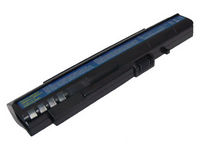Although your battery will eventually die, proper care can put off the inevitable. Here's how to keep your laptop battery working for as long as possible. With luck, it could last until you need to replace that aging notebook (perhaps with a laptop having a longer battery life).
I've also included a few tips on keeping the battery going longer between charges, so you can work longer without AC power.

Don't Run It Down to Empty
Squeezing every drop of juice out of a lithium ion battery (the type used in today's laptops) strains and weakens it. Doing this once or twice won't kill the battery, but the cumulative effect of frequently emptying your battery will shorten its lifespan.
The good news: You probably can't run down the battery, anyway--at least not without going to a lot of trouble to do so. Most modern laptops are designed to shut down before the battery is empty.
In fact, Vista and Windows 7 come with a setting for just this purpose. To see it, click Start, type power, and select Power Options. Click any one of the Change plan settings links, then the Change advanced power settings link. In the resulting dialog box, scroll down to and expand the Battery option. Then expand Critical battery level. The setting will probably be about 5 percent, which is a good place to leave it.
XP has no such native setting, although your laptop may have a vendor-supplied tool that does the same job.
Keep It Cool
Heat breaks down the battery, and reduces its overall life.
When you use your laptop, make sure the vents are unblocked. Never work with the laptop on pillows or cushions. If possible, put it on a raised stand that allows for plenty of airflow.
Also, clean the vents every so often with a can of compressed air. You can buy this for a few dollars at any computer store. Be sure to follow the directions on the can, and do this only when the notebook is off.
Give It a Rest
If you're going to be working exclusively on AC power for a week or more, remove the battery first.
Otherwise, you'll be wearing out the battery--constantly charging and discharging it--at a time when you don't need to use it at all. You're also heating it up (see "Keep It Cool," above).
You don't want it too empty when you take it out. An unused battery loses power over time, and you don't want all the power to drain away, so remove it when it's at least half-charged.
Never remove the battery while the computer is on, or even in standby or sleep mode; doing so will crash your system and possibly damage your hardware. Even inserting a battery into a running laptop can damage the system. So only remove or reinsert the battery when the laptop is completely off or hibernating.
If you've never removed your laptop battery and don't know how, check your documentation. (If you don't have it, you can probably find it online.) The instructions generally involve turning the laptop upside-down and holding down a button while you slide out the battery.
没有评论:
发表评论